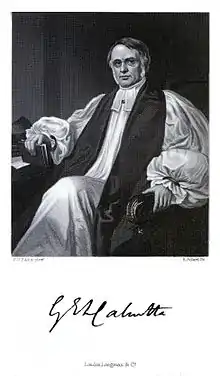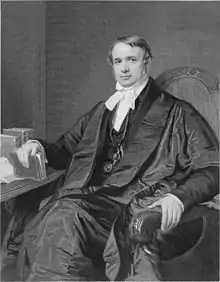George Cotton
George Edward Lynch Cotton or Bishop Cotton (29 October 1813 – 6 October 1866) was an English educator and clergyman, known for his connections with British India and the public school system.
George Edward Lynch Cotton | |
|---|---|
| Bishop of Calcutta | |
 Bishop Cotton | |
| Church | Church of England |
| See | Calcutta |
| In office | 1858–1866 |
| Personal details | |
| Born | 29 October 1813 Chester, England |
| Died | 6 October 1866 (aged 52) Kushtia, India |
Life in England

He was born at Chester, a grandson of the late George Cotton, Dean of Chester.[1] He received his education at The King's School, Chester,[2] Westminster School, and at Trinity College, Cambridge.[3] Here he joined the Low Church party, and was a close friend of several disciples of Thomas Arnold, including CJ Vaughan and WJ Conybeare. Arnold's influence determined the character and course of Cotton's life.[4]
He graduated BA in 1836, and became an assistant master at Rugby School. He became master of the fifth form in about 1840.[4] In 1852 he accepted the appointment of headmaster at Marlborough College. Both Rugby School and Marlborough College boarding houses were subsequently named after him.
India
In 1858 Cotton was offered the office of the Bishop of Calcutta, which, after much hesitation, he accepted. The government of India had just been transferred from the British East India Company to the crown, and questions of education were eagerly discussed, following Macaulay's famous Minute on Indian Education.
Cotton established schools for British and Eurasian children including the Bishop Cotton School Shimla. The Bishop Cotton Boys' School and Bishop Cotton Girls' School in Bangalore were established in his memory. The Bishop Cotton School in Nagpur also bears his name. He founded many other schools in India, including St. James' School in Calcutta and Cathedral and John Connon in Bombay.
As the senior Anglican prelate in India, he also consecrated a number of new churches throughout the subcontinent, including St. Luke's Church, Abbottabad, and others on what then used to be the 'Punjab Frontier' and later became the North West Frontier Province.
Cotton married Sophia Ann Tomkinson, daughter of Reverend Henry Tomkinson, on 26 June 1845. Their son Edward Cotton-Jodrell was later MP for Wirral.
A memoir of his life with selections from his journals and correspondence, edited by his widow, was published in 1871.
Death
On 6 October 1866, he had consecrated a cemetery at Kushtia on the Ganges, and was crossing a plank leading from the bank to the steamer when he slipped and fell into the river. He was carried away by the current and never seen again.[4]
The phrase "to bless one's cotton socks" is traceable to Cotton's death. While Bishop of Calcutta, Cotton ensured that children in his schools had socks to wear, and he blessed the socks upon their arrival, as he did other goods. Over time, "Cotton's socks" became "Cotton socks". Upon his sudden death, the Archbishop was asked, "Who will bless his cotton socks".[5]
References
- The Peerage – Thomas Davenant Cotton
- "Inspirational Alumni Members". The King's School Chester. Archived from the original on 15 December 2011. Retrieved 2 December 2011.
- "Cotton, George (CTN832GE)". A Cambridge Alumni Database. University of Cambridge.
- Chisholm 1911.
- https://www.theguardian.com/notesandqueries/query/0,,-1344,00.html
- Attribution
 This article incorporates text from a publication now in the public domain: Chisholm, Hugh, ed. (1911). "Cotton, George Edward Lynch". Encyclopædia Britannica. 7 (11th ed.). Cambridge University Press.
This article incorporates text from a publication now in the public domain: Chisholm, Hugh, ed. (1911). "Cotton, George Edward Lynch". Encyclopædia Britannica. 7 (11th ed.). Cambridge University Press.
External links
- Bibliographic directory from Project Canterbury
- Arbuthnot, A. J.; Savage, . David W. "Cotton, George Edward Lynch (1813–1866)". Oxford Dictionary of National Biography (online ed.). Oxford University Press. doi:10.1093/ref:odnb/6412. (Subscription or UK public library membership required.)
- Arbuthnot, Alexander John (1887). . In Stephen, Leslie (ed.). Dictionary of National Biography. 12. London: Smith, Elder & Co.
- Memoir of George Edward Lynch Cotton, D.D. 1871
| Church of England titles | ||
|---|---|---|
| Preceded by Daniel Wilson |
Bishop of Calcutta 1858–1866 |
Succeeded by Robert Milman |